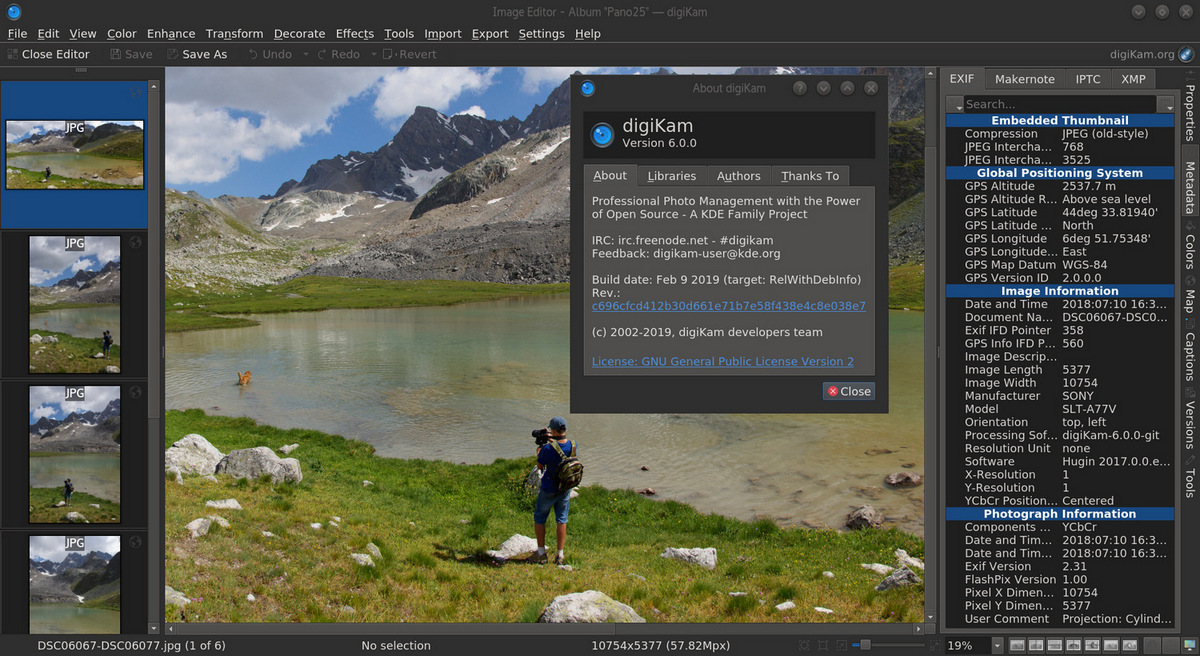 Versie 6.3 van digiKam is uitgekomen. Deze fotobeheer- en beeldbewerkingsapplicatie heeft downloads voor Linux, BSD, macOS en Windows. Het bevat ondersteuning voor uiteenlopende bestandsformaten en kan daarnaast via plug-ins van meer mogelijkheden worden voorzien, zoals het exporteren van een album naar Facebook of Flickr. Meer over de mogelijkheden van dit programma is op deze pagina te vinden. De release notes voor deze uitgave zien er als volgt uit:
Versie 6.3 van digiKam is uitgekomen. Deze fotobeheer- en beeldbewerkingsapplicatie heeft downloads voor Linux, BSD, macOS en Windows. Het bevat ondersteuning voor uiteenlopende bestandsformaten en kan daarnaast via plug-ins van meer mogelijkheden worden voorzien, zoals het exporteren van een album naar Facebook of Flickr. Meer over de mogelijkheden van dit programma is op deze pagina te vinden. De release notes voor deze uitgave zien er als volgt uit:
digiKam 6.3.0 is releasedWe received a lot of excellent user feedback after publishing the third digiKam 6 release in August 2019. We are now proud to briefly announce the new digiKam 6.3.0, a maintenance version which consolidates this feedback and acts as an important phase of this 3-year-old project.
New GMic-Qt plugin for Image EditorSince digiKam 6.1.0, we open digiKam to external contributions with a collection of new plugin interfaces, named “Generic” for album items processing and export to web-services, “Editor” to extend Image Editor and Showfoto post processing, and “Bqm” to add new tools in Batch Queue Manager.
With this release, a first official external tool have been ported to digiKam plugin architecture: GMic-Qt. This tool based on GMic library, a processing engine known for its noise removal filters, came from an earlier project called GREYCstoration. G’MIC offers many built-in commands for image post-processing, including basic mathematical manipulations, look up tables, and filtering operations. More complex macros and pipelines built out of those commands are defined in its library files.
G’MIC comes with a Qt-based graphical interface named GMic-Qt, which may be already integrated as a Gimp or Krita plugin. It contains several hundred filters written in the G’MIC language, dynamically updated through an internet feed. The interface provides a preview and setting sliders for each filter.
G’MIC is one of the most popular Gimp plugins, which is now also available officially for digiKam and Showfoto. If you don’t know yet G’MIC, we recommend highly to take a look to this review published on a Pixls.us blog one year ago.
DPlugins Demo Project on GitHubOn GitHub, a new project have been started recently to host a collection of plugins dedicated to document and test the architecture. Source codes of few HelloWorld plugins are available to help future external contributors to write new tools for digiKam and Showfoto.
This project have been voluntary separated of digiKam, and still under development. It needs more time to write code in goal to use whole exported digiKam API with code examples.
Migration to GitlabHistorically, digiKam has always used the KDE infrastructures to manage the project. We use Git repositories to host source code, Bugzilla to manage reports, Phabricator for pull-requests, and Jenkins for the continuous integration, deployment, and static analysis.
One year ago, KDE team start to search a collaboration with a major developpement Web service to increase the visibility and the accessibility for new contributors to the infrastructure hosting open-source projects. They select GitLab platform for technical reasons. A migration of KDE projects have been started quickly and digiKam have been one of the first to be ready for this kind of move. The KDE GitLab area have been named invent.kde.org.
So the new Gitlab integration with git repositories was completed in end of August and we have now 3 places to host source code:
For the future, we will use step by step the GitLab platform tools.
Website UpdateFollowing the gitlab migration of web-site repository, some important parts have been updated, especially the pages to introduce the application, to present the project overview, and list all main features in details.
Plenty of new screenshots have been added and also the list of features have been in-depth updated. This will help future new users to judge the application before to choice digiKam as main personnal photo manager.


:fill(white):strip_exif()/i/2002517552.jpeg?f=thumbmedium)